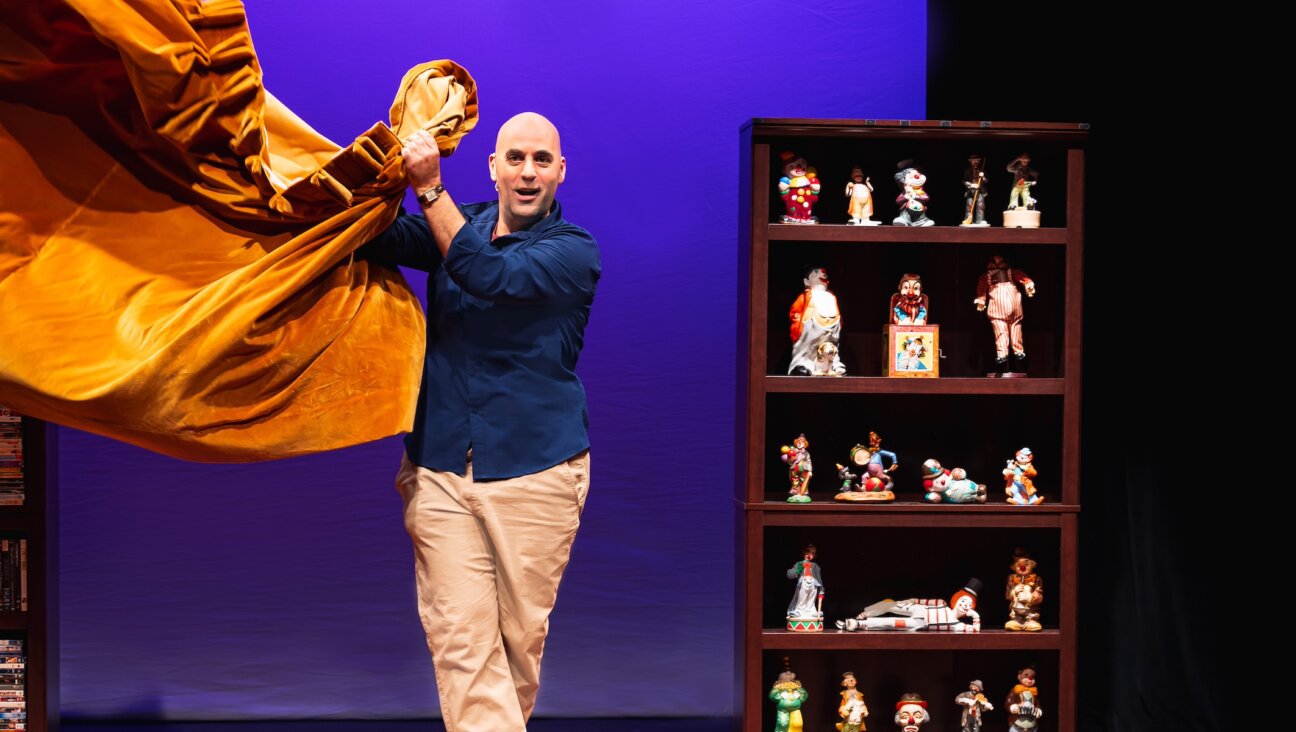Vladimir Slepak, Famed Soviet Refusenik, Dies

One of the most iconic activists in the Soviet Jewry movement, Volodya Slepak, has died. A man with a fascinating life story, Slepak’s father had been a diehard communist who opposed his son’s 17-year-long struggle to emigrate out of the Soviet Union (a generational battle chronicled beautifully by Chaim Potok in his book, ). Slepak’s large bushy beard, streaked with gray and parted at his chin, kinky hair and thick body, usually encased in a wool sweater, gave him the larger than life appearance of a fairy tale wolf. It was his smile that first greeted most American Jewish visitors on their covert missions to refuseniks in the 1970s and 80s. The Slepaks’ apartment, on central Gorky Street, was a sort of headquarters for the movement. His resilience and his good humor despite all the many obstacles – including being internally exiled to a village near the Mongolian border – was mesmerizing to behold.
Here’s an excerpt from my book, “When They Come for Us, We’ll Be Gone: The Epic Struggle to Save Soviet Jewry,” that the Forward published in 2010, recounting the day that Volodya and his wife, Masha, were arrested by the KGB.
By the late 1970s, a number of refuseniks were so well known to activists in the West that they became household names. Volodya and Masha Slepak and Ida Nudel certainly fell into this category. The Slepaks were larger than life characters who were often the first contact for tourists looking to meet refuseniks. And Nudel, a small, gutsy woman, became known as the “guardian angel” of those who had been imprisoned for their activism. But in 1978, following the arrest of Anatoly Shcharansky and the charge of treason leveled against him, the Slepaks and Nudel became vulnerable. After years of evading arrest, an act of defiance one summer day finally forced them all to fall victim to Soviet justice.
An atmosphere of terror swept through the refusenik community in the months following the Shcharansky arrest. Everyone was interrogated and treated like a potential suspect (“Today you are a witness, but soon you’ll be a defendant,” one was told). It seemed only a matter of time before the whole movement was dismantled. In a collective appeal to the West, 250 refuseniks warned that the accusation of espionage was “one of the most dramatic moments, perhaps one of the major turning-points in the history of Jews in Russia.” They compared this new threat to the Dreyfus affair, the Mendel Beilis trial and the Doctors’ Plot, all historical incidents when falsely accused Jews became scapegoats, an excuse for unleashing widespread anti-Semitism and even more persecution. “On the surface, only a small part of the erupting volcano can yet be seen. All the rest is inside, hidden, concealed from view. What is being cooked up down there in the depths is as yet unknown to us, but we shall no doubt very soon feel it, and experience the full effects of the depth of the anti-Jewish prejudice being stirred up to vomit forth from the mouth of the volcano.”
The signs were not good for the refuseniks and the pressure to desist from their activities was immense. And yet, all they could do was continue to try to bring attention to their cause. In fact, the logic of nonviolent demonstration demanded that they take advantage of this moment of great repression to further dramatize their situation.

Comrades: An iconic photo of the most famous refusenik activists, taken in Moscow in 1976. Volodya Slepak, with beard, is the first in the back row. In the middle of the first row is Anatoly Shcharansky and next to him is Ida Nudel. Image by Beit Hatfutsot Photo Archive
It was this combination of dejection and determination that drove a group of refusenik women to involve their sons and daughters in a massive protest to be held on June 1, 1978, the day the Soviet Union called International Children’s Day. Originally the plan was to gather on five different balconies all over Moscow and at 45-minute intervals drape banners or hang signs protesting the government’s emigration policies. But some of the women became frightened by the police cars surrounding their buildings the evening before and abandoned their protest. The rest decided to all congregate in one apartment. There they spent the night on the floor in sleeping bags, preparing for the next day’s battle.
In another apartment, alone that night, was Ida Nudel — chief advocate for the Jewish prisoners — a small, tough woman, now 47 and prematurely aging with a streak of gray shot through her long black hair. She had decided to join the protest, but alone, with a barricade of furniture pushed up against her apartment door. She wrote out her sign on a long piece of butcher paper, “KGB — Give Me a Visa to Israel.” On the morning of June 1, Nudel found a bulldozer parked in front of her building and four KGB agents sitting on the balcony next to her own. She prepared to defend herself against those whose job it would surely be to tear the banner out of her hands. She filled up a bucket of water to throw at them and lay pieces of nail-studded wood on the balcony floor. As evening approached and with it her appointed time to unfurl her sign, she became more anxious. A crowd of policeman was gathered below, all staring up at her apartment.
That same day, Masha Slepak was trying to decide whether to take part in the demonstration. The Slepaks had remained at the center of the Jewish movement. Volodya was now known all over the world — his apartment was still the first stop for Jewish tourists visiting Moscow. He never tired of telling his story, amusing them with his eccentric appearance (the large beard and lumbering body) and good nature. The door to the apartment on Gorky Street, only a few yards from the Kremlin, was always open. But, now in their eighth year of refusal, the struggle had taken a toll on his family. For one thing, the Slepaks were technically divorced. They had always tried to keep their children from suffering for their stand, but their high profile made this impossible. They divorced so that Masha might emigrate separately with their younger child. But this didn’t work. OVIR [the Soviet office which handled exit visas] was not fooled. The big worry had always been that their son Leonid would reach the age of conscription and be drafted into the army. And that’s exactly what happened. Leonid responded to the draft notice in a letter that explained that he considered himself an Israeli citizen in absentia and so could not serve in the Soviet army. He then went underground. He traveled the country by train, first to Yerevan, Armenia, and then back to Leningrad and Moscow, where he hid in various apartments. Masha and Volodya constantly worried that he would be thrown into jail. Their eldest, Sanya, had actually managed to get an exit visa in the fall of 1977 after years of being denied work or placement in any university.
Deprived of her two children and far more fatalistic than her husband, Masha Slepak was increasingly despairing in her life of endless waiting. On the morning of the Children’s Day protest, she tried to open the door to her apartment to walk their dog, and found that it had been fastened shut, tied with rope to the stairway. Since Masha was part of the women’s group, the KGB assumed the Slepaks had helped plan the protest. Masha had had it. She told Volodya that she couldn’t stand to be humiliated anymore. She made up her mind to join the demonstration. Together they took a sheet and painted on it these words: LET US GO TO OUR SON IN ISRAEL. Volodya locked the door to their apartment and then the door to their bedroom. They stepped outside onto the balcony and draped the sheet over the balcony’s edge so that all of Gorky Street, one of Moscow’s busiest and grandest boulevards, could see the words hanging off the eighth floor.
After about half an hour a huge crowd began forming below, straining to see what was written. Traffic nearly stopped and the passage of the trolleys that went up and down the street was blocked. A few people started screaming anti-Semitic slurs. Police officers on the upstairs balcony were using a stick to try to knock the banner away. At one point Volodya got hold of the stick, snapped it in half, and threw it down to the street below. “They should use a pistol!” someone in the crowd shouted up at the police. It was a warm day and people were enjoying the cat-and-mouse spectacle. Soon almost a thousand people were clogging Gorky Street to get a look. The Slepaks gripped their sheet and, though astounded by the giant, jeering crowd, told each other they would not budge. Volodya suddenly felt a burning on his head and realized that boiling hot water was being poured on him from the ninth floor balcony, the one above theirs. They stepped away from the edge, still clutching the sign, and then they heard the sound of their apartment door being hacked apart with axes. Masha didn’t want to give the spectators the satisfaction of seeing them arrested. Just as KGB agents were destroying their locked bedroom door, the two re-entered their apartment. The sheet was yanked from their hands and they were led downstairs and placed in a prison van.
This scene was repeated in the one apartment where 11 women and their 13 children had gathered. They tried to hold out, blocking their door with a sofa and desks, and chanting. But after 20 minutes, the KGB broke through and detained all of them.
At six in the evening Ida Nudel was ready to go out on her balcony, unaware of all the earlier arrests. Her apartment too had been sealed off. She attached her banner to the ends of two skis and carried it out to the balcony as the day’s light was fading. Almost immediately, from the window of an adjoining apartment, the KGB reached in with hooked metal rods, caught the banner, and pulled it until it tore off the skis in two pieces and floated down to the street. Nudel was undeterred. She went back inside, wrote up another sign, returned, and fastened it to the skis again. This time when the agents tried to attack her banner, she threw water at them. They switched to a new strategy, going to the balcony above hers and swinging a wrench tied to the end of a rope until it eventually smashed her window. At the sound of breaking glass, the gathering crowd cheered as if at a football game. Frightened and assaulted from all sides, she moved back into her apartment, which was now covered in shards of glass. As day turned into night, the police stopped pounding on her barricaded doors, and Nudel lay on her couch, fully dressed, and fell asleep.
She was seized on the street the next day, just after meeting with foreign correspondents and recounting what had happened. Three uniformed policeman drove her back to her apartment; on her door, someone had pinned a drawing of three pigs under the words Zionist swine. Nudel sat in a chair and watched the KGB conduct a search. Her apartment was already a mess with the upturned furniture and shattered glass, and now they were dumping every piece of paper out onto the living room floor. They charged her with “malicious hooliganism” and forbade her to leave the city.
The trials of Volodya Slepak and Ida Nudel took place three weeks later on the same day, June 21, and in the same courthouse. Both were accused of the same crime. Slepak chose to defend himself without the help of the court-appointed attorney. Nudel was surprised that her lawyer actually tried to defend her. But no witnesses were allowed to testify on behalf of either defendant. Both courtrooms were small and filled with unsympathetic audiences. The great Soviet dissident Andrei Sakharov and his wife, Elena Bonner, along with much of the refusenik community and representatives from the American Embassy were all kept out, as were reporters. They massed on the street instead. At one point the police even turned a fire hose on the crowd when it got too close to the courthouse.
After a few hours of futile defense, Volodya Slepak was found guilty of public disorder and sentenced to five years of internal exile.
At Ida Nudel’s trial, the evidence of her “malicious hooliganism” was laid out in front of the judge: a bottle of ink, a brush, a rolled up piece of paper. The defense lawyer conceded that Nudel was a strange character (she “does not get along very well with our society”) but still asked the court for an acquittal, which was an unusual move for a KGB-sanctioned attorney. This caught her off guard and instead of remaining silent throughout the trial as she had planned, she decided to make a final statement before her sentencing. With her voice catching in her throat, she described her trial as an indictment of her activism:
I am being tried in fact for the last seven years, the most wonderful years of my life. If I should ever find myself obliged to deliver another final plea, I am absolutely convinced that I shall affirm once again that the seven years which are the cause of this trial were the most difficult but also the most wonderful of my life. During the seven years, I learned to walk with my head high, as a human being and as a Jew. The seven years have been full of daily struggle on behalf of myself and others. Every time that I was able to keep a victim alive, I experienced a rare and intense emotion comparable, perhaps, to the joy of a woman who has given birth. Even if the remainder of my life should turn out to be gray and uneventful, the memory of those seven years will warm my heart and reassure me that I have not lived my life in vain.
Ida Nudel received four years of internal exile.
Absent that day from her husband’s trial was Masha Slepak. She had eaten moldy black bread during her detention and was in the hospital suffering from extreme stomach ulcers. She heard the verdict on the radio. Just before her own trial, she went to visit Volodya in jail. Masha didn’t know whether they would be exiled together or separately, since they were technically divorced. Looking at her husband through Plexiglas, she saw that his hair had grown even bushier than usual and she told him he needed a haircut. “No, it’s alright; this way it’s warmer,” Volodya answered, smiling. They tried to strategize for her trial. They talked about their sons. And before they knew it, their time was up. On the next visit, the authorities informed her that Volodya was no longer there. He had been moved to a transit prison to begin his long journey east.
Contact Gal Beckerman at [email protected]
























